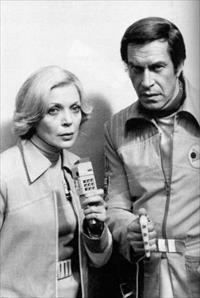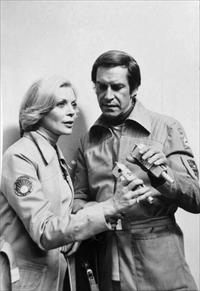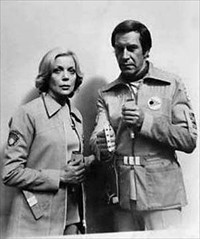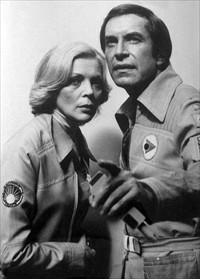Humo (Belgium)
Humo is a TV and radio listing magazine in the Flemish (Dutch-speaking) part of Belgium. Flemish channel BRT started to show the first series of Space: 1999 in January 1977. Like most foreign TV, it was shown in English with Dutch subtitles.
This edition is from the 17th February 1977. BRT was showing the 8th episode of Year 1. At the time, Belgian viewers had not seen Year 2 (which started in June, immediately after 17 episodes of Year 1).
The cover is a colourised and reversed black and white photo (it is seen correctly against the article).
Science-fictionverhalen vormen best een hartige brok thrillend leesvoer voor bij de centrale verwarming, maar omgebouwd tot het kartonnen kader van een tv-feuilleton lijken ze vaak stukjes Jan Klaassen-poppenkast voor grote mensen. Tenminste als je niet bij de eerste flits van een buitenaards gedrocht de lachstuipen krijgt. Dat gevoel bekroop ons niet alleen met Voyage to the Bottom of the Sea en Thunderbirds - dat was trouwens met poppen - maar ook met De Vrouw van Zes Miljoen en nu met Space 1999. Begrijpelijk is het wel. In een SF-roman is de fantasie aan de macht en kan het ondermaanse individu bij wijze van spreken van planeet tot planeet kuieren zoals u en ik om een plak kaas bij de kruidenier aanlopen, maar in een tv-feuilleton zou dat lachwekkend en vooral ongeloofwaardig overkomen. Dat wordt dan vlot verholpen door een barokke overdaad aan machinerie, technische snufjes, gestoei met computers, en paniekerig geflikker op een of ander dash-board. En elke Westerse sterveling heeft wel één keer in zijn leven een Apollo of Sojoez zien opstijgen, zodat de identifikatie met de SF-fictionhelden maximaal is. Er is zelfs meer : de SF-literatuur trekt alle registers van de verbeeldhg open maar de SF-tv-feuilletons hebben een typische Amerikaanse nasmaak : ze zijn stuk voor voor stuk toegespitst op het thema : de mens (lees Amerikaan) verovert de ruimte die tot dan toe beheerst werd door gruwels, kobolten, monsters, kortom, buitenaardse slechteriken. Ook in hun fantasie blijven de Amerikanen kolonialen en imperialisten. Dat was zo in Star Trek, dat is zo in Space 1999.
HUMO : Waarom moet er na een serie als Star Trek nog een soort bastaardprodukt als Space 1999 volgen ?
Gerry Anderson (producer van "Space 1999", Thunderbirds en Ufo): De meeste SF-series zijn in het verleden plat gevallen omdat ze ofwel degelijke scripts en slechte akteurs hadden, ofwel sterke akteurs en kreupele verhalen, ofwel "speciale effecten" waar je het karton doorheen zag. "Space 1999" biedt daarentegen het beste van het beste : prachtartiesten, ijzersterke plots, en superbe effecten.
HUMO : Elke SF-fiction serie heeft - o cliché - wel zijn buitenaards monster dat te vuur en te zwaard moet bestreden worden. King Kong is nog altijd niet dood ?
Anderson : Ja, maar ons monster is, geloof ik, het meest overtuigende monster ooit op filmgebied gemaakt, en zeker beter dan King Kong. "Space 1999" valt of staat met die effecten. Er heeft een ploeg van 25 tot 30 man twee jaar aan gewerkt. In vrijwel elke aflevering zie je een ander ruimteschip, en is sensatie het motto. Eigenlijk willen wij voor tv maken wat Towering Inferno voor de bioscoop is geweest.
Te weten : een kassukses.
Space 1999 BRT-tv woensdag 23 febr. 18.50 u.




Science fiction stories provide hearty thrilling reading, but converted into the cardboard framework of a television serial they often seem to be Punch and Judy puppetry for big kids. At the first flash of an alien monster you get laughing convulsions. That feeling not only happens to us with Voyage to the Bottom of the Sea and Thunderbirds - which was by the way with puppets - but also with the Bionic Woman and now with Space 1999. It is understandable. In an SF novel, the imagination is in power and the terrestrial individual can go from planet to planet, like you and I going to get a slice of cheese at the grocery store. But in a television series that would be laughable and above all unbelievable. This is remedied by a baroque overcrowding of machinery, technical gadgets, wrestling with computers, and panic-lights flashing on some dashboard. Every Western mortal has seen an Apollo or Soyuz once in his life so we can identify with the science fiction heroes. There is even more: SF literature pulls out all the stops in imagination, but the SF TV series have a typical American flavour. They focus on the theme: man (read American) conquers space that was controlled by abominations, monsters; in short, alien bad guys. Even in their imagination, Americans remain colonial and imperialist. That was the case in Star Trek, and in Space 1999.
HUMO: Why after a series like Star Trek should there be another derivative product like Space 1999?
Gerry Anderson (producer of "Space 1999", Thunderbirds and Ufo): Most SF series have fallen flat in the past because they either had sound scripts and bad actors, or strong actors and lame stories, or "special effects" where you saw the cardboard. "Space 1999", on the other hand, offers the best of the best: magnificent artists, strong plots, and superb effects.
HUMO: Every SF fiction series has - oh cliché - its extraterrestrial monster that must be fought with fire and sword. Is King Kong still not dead?
Anderson: Yes, but our monster is, I believe, the most convincing monster ever made in the cinema, and certainly better than King Kong. "Space 1999" falls or stands with those effects. A team of 25 to 30 men has worked for two years. In almost every episode you see another spaceship, and spectacle is our motto. In fact, we want to make TV what Towering Inferno was for the cinema.
That is, a box office hit.
Space 1999 BRT TV Wednesday 23 February. 6:50pm.
* The title is play on a Dutch idiom - "give my portion to the dog", meaning "I don't want any part of it."
Space: 1999 copyright ITV Studios Global Entertainment. Thanks to Gordon Moriguchi